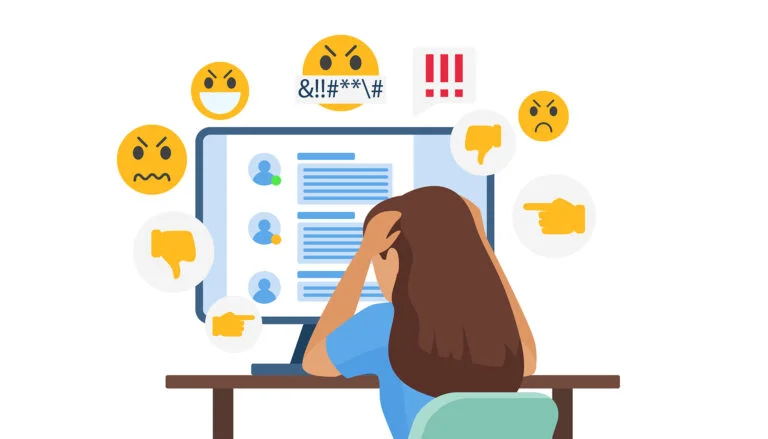An introduction to the Norwegian Working Environment Act is and how it protects against workplace bullying in Norway.
Even though the Norwegian Labor market, for the most part, is fair and equal, it’s not always as rosy-red as people may think. If you don’t get along with your boss or feel unfairly treated, it may well be that you are being bullied by your boss.

According to Statistics Norway (SSB), 7% of Norwegians were bullied or sexually harassed in 2017, and bullying very often leads to symptoms of stress, insomnia, depression and anxiety.
How do you know when your boss oversteps the line
We have a complicated system of laws regulating the Norwegian Labour market, but when it comes to human behaviour, very little is black and white. Additionally, there are unwritten rules within Norwegian society, and even within each company.
Being a foreigner and applying all of this to a situation where we are supposed to be our most professional and productive selves is extremely difficult. That’s especially so when coming from a culture that is totally different.
For example, in Japan, and other countries, there are strict customs in regards to dealing with people above you in a hierarchy. How do you then know when your boss oversteps the line, and would you speak up?
Bullying is illegal
According to The Norwegian Working Environment Act (Arbeidsmiljøloven), it is not legal to bully someone. One single episode is usually not considered bullying, unless it is very serious, but should be a consistent pattern over time.

It may go without saying, but there may be some examples where you should consider contacting the police, like when being exposed to sexual harassment.
Examples of bullying, according to The Norwegian Labour Inspection Authority (arbeidstilsynet.no)
- Not including someone in social settings
- Bypassing, neglecting or ignoring someone when handing out work-tasks
- Giving unreasonably or exaggerated blame for bad work
- Teasing someone
- Making fun of or ridiculing someone
Many people who bully act subtly, and not only through words, but also with disrespectful body language and even tone of voice. All of this is very hard to detect and prove, and even describe.
However, it is very effective when it comes to breaking people down.
Unfortunately, some people are easier targets; like those who may have lower productivity or even rationality, because of mental health illness or problems at home, people who haven’t learned the unwritten rules, or people you don’t expect will speak up.
It's not your fault
Having worked with HR for 20 years, I have seen many cases of bullying.

Although many people get help to solve the problem, there is a very common pattern: People don’t realize they actually are bullied and think they have done something wrong. This is not unlike what victims of all kinds of abuse feel.
It results in feelings of shame, guilt, and uselessness. Many feel they deserve the treatment, and most end up quitting without telling anyone. Many take it out on their family, and many end up getting ill.
Contrary to what you would think, many people who are bullied have a high level of performance.
A personal experience of workplace bullying
I had a boss who treated me so badly that I chose to quit. And it happened when I was extremely vulnerable. She laughed at things I said in meetings, or rolled her eyes.
She accused me wrongfully of telling my doctor things that would entitle me leave. She would talk to others behind my back and hint of laziness and lack of interest. She would say this at lunch hour “she never participates in anything” or “when she leaves, she won’t get a recommendation”.
She spoke to me like I was a small child, and initiated meetings where I was accused of things on the spot without any opportunity to prepare. She made small mistakes that would give me disadvantages, which were impossible to detect.

She put off replying to important emails, and when I asked, she told me I was nagging. It is not acceptable in Norway to treat professional adults like that. And even though I knew, I didn’t tell anyone.
What do you do?
If possible, it is best to tell the person that bullies straight out that you don’t accept this kind of behavior, although few people would have the courage to do so.
If the behavior doesn’t stop, consider talking to a coworker you trust. When a boss behaves inappropriately, it quite likely affects other people too.
All Norwegian businesses who employ more than 10 people are obliged to have a safety representative (verneombud). This is a person who is neutral, and not allowed to share information without your permission.
A union representative also has the same role, but can in addition help and give guidance regarding salary and the legal aspects of employment. It is also possible to talk to HR.
Whistleblowing
The Norwegian Working Environment Act, also has a chapter on whistleblowing, and most businesses have internal procedures in addition.

Notwithstanding, employers are obliged to follow certain steps. They have to investigate thoroughly and within an acceptable time frame. It is not legal to meet whistleblowers with any kind of repercussions.
Evidence
When being bullied, it is always important to collect evidence, like emails and documents. It is also legal in Norway to record conversations without the other person’s knowledge.
However, it may not always be possible to use as evidence in court.
Legal action
The Norwegian Anti-Discrimination Tribunal is a neutral governmental organization, and represents no party. The Tribunal is an alternative to talking legal action in cases of workplace discrimination, harassment and retaliations. It is free of charge.
A very few cases of bullying end up in the court system, and there is very little precedence. This is risky business, as you end up paying for all legal costs.
Don’t keep it to yourself
If you're experiencing workplace bullying, it's very important you tell someone. And remember you are not alone, it happens to many people.
There is also a system in place in Norway that will help you, and most people will understand. Just don’t keep it to yourself.


When suffering bullying in the workplace in Norway. To whom should I talk? How to seek help?
How about if its the employee herself bullying the supervisor at work? Like not doing her work. Spend her time talking and chatting. Pushing work to others in the team and still later claim in overtime hours to do her work she was supposed to do during her normal working hours. Taking long lunch breaks, And she herself complained to the workers union for being ‘bullied’. She is extremely good in talking and PR skills. So what to do to people like that? It’s my husband who is suffering and stressed at work and home cos they cannot do anything to her as she is extremely good in talking and will twist her way out of situations and make it favourable to her instead. It is extremely frustrating to have people like that who gets paid for nothing! And believe me I see people like these everywhere. Good in talking but cannot work. It’s extremely unfair to everyone in the team who has to do her work and suffer for her inability to work.